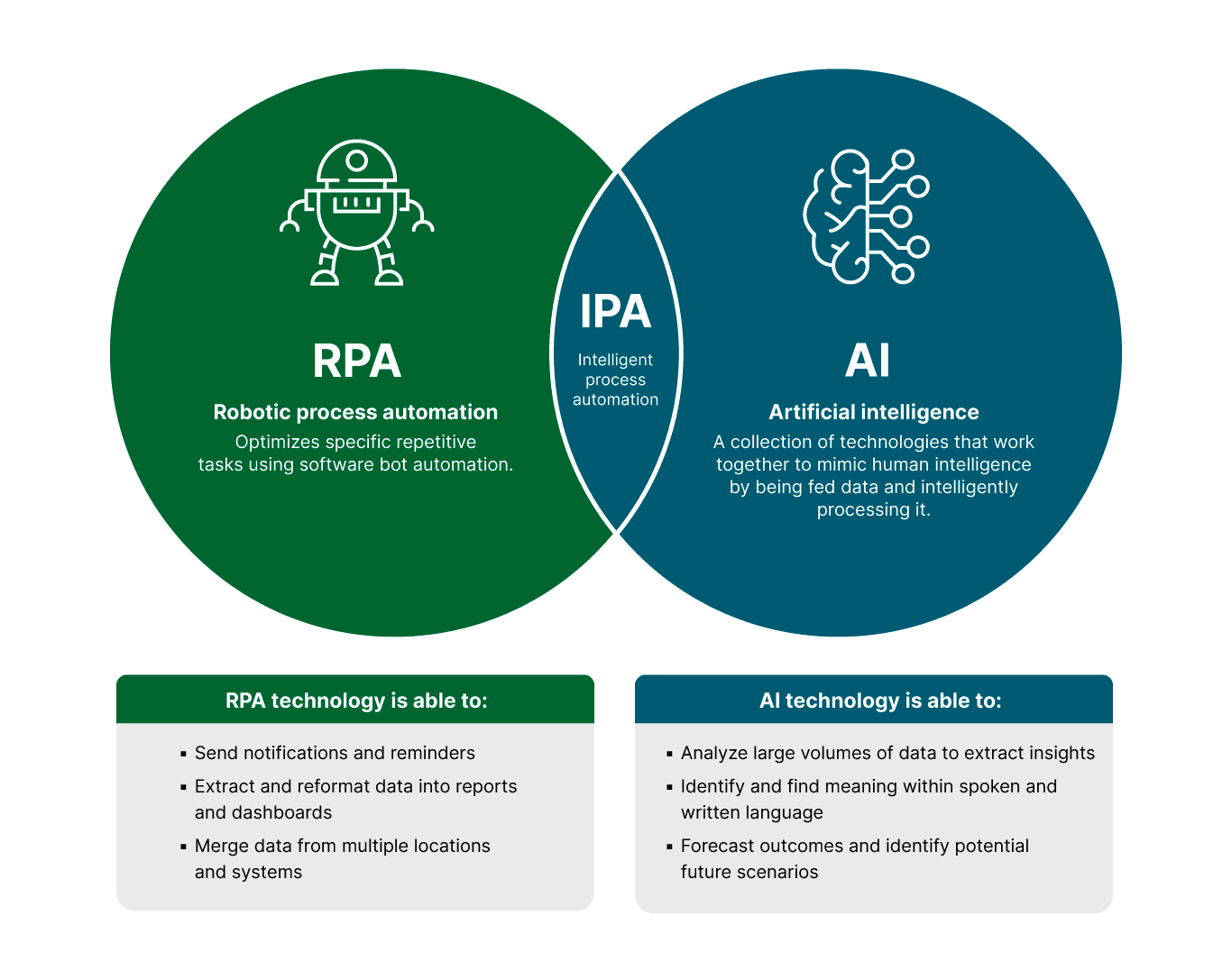Deep dive into RPA and Intelligent Automation
With its potential to automate mundane tasks and allow teams to focus on more strategic work, RPA is already a critical component of digital transformation initiatives.
With its potential to automate mundane tasks and allow teams to focus on more strategic work, RPA is already a critical component of digital transformation initiatives.

Robotic process automation (RPA) uses software robots to automate repetitive, rules-based tasks in a process.
The advantage of using RPA is that it can handle high-volume, repeatable tasks efficiently and accurately. This frees up your human workforce to handle more complex problem-solving tasks.
Here are some manual processes that can be replaced with RPA:
Organizations that leverage RPA drive incremental but powerful impacts on automated processes. These benefits include:
RPA enables departments to automate repetitive and rules-based tasks that speed up business cycles. This eliminates the margin for human error and will complete tasks on time, all the time.
All steps are recorded and can provide audit trails, and bot activity can be checked against regulations to ensure compliance. Because RPA bots follow predefined rules, they will always act in compliance with the relevant regulations.
While RPA bots finish tasks, they also monitor them and gather information. This information can be fed back to decision-makers to give them better insights. This leads to more informed decisions and makes it easier to monitor impacts.
Using RPA to complete manual tasks frees employees to focus on higher-value activities. This improves employee engagement and optimizes RPA use. In turn, this increases business productivity.
RPA performs tasks with high precision and consistency, resulting in fewer errors. This means less time and resources spent on error correction and costly delays.
Using RPA processes to integrate your legacy systems with core systems will not be an issue. Plus, with low-code configuration, RPA software is easy to build and manage, and it requires minimal effort from your IT teams. This makes it easily scalable across business operations and allows you to change processes in the software with zero or minimal downtime.
Advanced RPA tools have built-in error handling and exception management capabilities to manage unforeseen issues during automation. This ensures continuity and minimizes disruptions.
Leading RPA platforms include robust security features to ensure data is handled securely. This includes encryption, secure credential storage and compliance with regulatory standards.
Learn more | Before you invest in AI, assess your AI-readiness
RPA bots are capable of being programmed to fix their errors and improve over time. They can be set up to recognize triggers and situations, helping them complete tasks automatically.
Here is a step-by-step breakdown of how RPA bots work:
RPA automates rules-based tasks; integrating AI allows bots to handle processes that require human-like intelligence, such as understanding documents with unstructured data and carrying out conversations. This combination unlocks new possibilities for enterprise automation, enhancing overall efficiency and resilience.

The success of your RPA implementation relies on which processes you choose to automate. Here are some questions that will help determine whether a process is optimizable with RPA:
RPA excels in performing tasks that follow a clear set of logical rules. This means processes that rely on human judgment may not be ideal candidates for automation.
Processes that occur on a regular basis or are triggered by specific events are perfect for RPA. The bots can be scheduled or programmed to start upon receiving certain prompts, ensuring tasks are completed on time.
RPA demands exact input to operate effectively. Ambiguity or variability in inputs can lead to errors. For instance, a bot handling invoice processing needs to know the location of the invoice data (input) and where to store the processed data (output). If these are well-defined and predictable, the bot can function autonomously, reducing reliance on manual intervention.
RPA bots can process large volumes of data quickly and accurately. This reduces the resources dedicated to manual processing. For example, in a healthcare context, RPA bots could handle the high-volume task of patient data entry, freeing up staff for more critical tasks and enhancing productivity.
Learn more | How does business process management (BPM) support RPA initiatives?
The Horry County’s Auditor’s Office — a government agency in South Carolina — received more than 90,000 personal property tax returns each year. It took its lean staff of six people almost six months to complete processing them.
To handle the increasing volume of incoming documents, the agency turned to Hyland RPA, a platform-agnostic RPA software, to modernize and automate several key processes.
In its first year, Hyland RPA helped Horry County autonomously process 33% of all tax returns, using advanced criteria to verify details and flag suspicious entries for human review.
For instance, when a taxpayer files a return claiming a certain property as their main residence, Hyland RPA checks this data against another business application, Aumentum. Based on the verification result, it then takes the necessary next steps.
Each bot action is then logged to facilitate easy troubleshooting later on. That’s just another benefit that speaks to the capabilities of Hyland’s RPA tool — which strengthens compliance measures by giving auditors access to user interactions to tax documents.

Now more than ever, it is imperative for organizations to leverage automation tools to address business challenges as part of digital transformation initiatives.
The addition of RPA technology is an integral component of Hyland’s intelligent automation strategy. Beyond merely automating processes, Hyland RPA offers intelligent components for improved efficiency, smart tracking of cognitive decisions and much more.
Hyland RPA extends the process automation capabilities of Hyland’s industry-leading content services platform, allowing organizations to easily enhance their solutions with more robust RPA processes.
Traditional automation often requires significant changes to the underlying IT infrastructure and involves custom coding to automate specific processes. RPA uses software bots to mimic human actions within existing systems. This makes it easier and faster to implement without altering current IT setups.
The implementation time for an RPA solution can vary depending on the complexity of the project. Many RPA solutions can set up within a few weeks, with significant results following soon after.
Most RPA platforms are designed to integrate seamlessly with existing systems, including legacy systems that may lack APIs. This makes RPA a flexible solution for automating processes across various platforms without requiring major system overhauls.
RPA platforms include robust security features such as encryption, secure credential storage and compliance with regulatory standards. This ensures data is handled securely throughout the automation process.
RPA is ideal for tasks that are repetitive, rules-based and high in volume. Examples include data entry, invoice processing, report generation and customer data updates. Processes with well-defined inputs and outputs are also excellent candidates for RPA.
By taking over repetitive and mundane tasks, RPA is designed to augment human work, not replace it.
The costs of implementing RPA vary based on the complexity of the project. RPA typically requires minimal upfront investment compared to similar technologies. It can then deliver rapid ROI by increasing efficiency and reducing operational costs.
Advanced RPA tools come with built-in error handling and exception management capabilities. These features allow bots to manage unforeseen issues during automation, ensuring continuity and minimizing disruptions. Bots can be programmed to log errors and trigger alerts for human intervention if necessary.